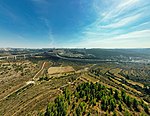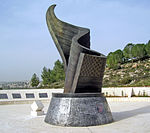Har HaMenuchot
1951 establishments in IsraelCemeteries established in the 1950sGeography of JerusalemHills of IsraelJewish cemeteries in Jerusalem ... and 1 more
Landforms of Jerusalem District

Har HaMenuchot (Hebrew: הר המנוחות, Ashkenazi pronunciation, Har HaMenuchos, lit. "Mount of Those who are Resting", also known as Givat Shaul Cemetery) is the largest cemetery in Jerusalem. The hilltop burial ground lies at the western edge of the city adjacent to the neighborhood of Givat Shaul, with commanding views of Mevaseret Zion to the north, Motza to the west, and Har Nof to the south. Opened in 1951 on 300 dunams (0.30 km2; 0.12 sq mi) of land, it has continually expanded into new sections on the northern and western slopes of the hill. As of 2008, the cemetery encompasses 580 dunams (0.58 km2; 0.22 sq mi) in which over 150,000 people are buried.
Excerpt from the Wikipedia article Har HaMenuchot (License: CC BY-SA 3.0, Authors, Images).Har HaMenuchot
Givat Shaul, Jerusalem Givat Shaul
Geographical coordinates (GPS) Address Nearby Places Show on map
Geographical coordinates (GPS)
| Latitude | Longitude |
|---|---|
| N 31.798055555556 ° | E 35.177777777778 ° |
Address
הר המנוחות/גבעת שאול
Givat Shaul
9546522 Jerusalem, Givat Shaul
Jerusalem District, Israel
Open on Google Maps









